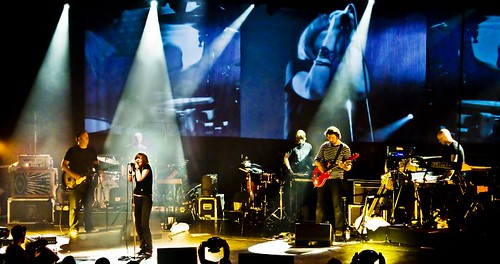
You can see Barrow’s point: It's hard to think of any recent musical style that's suffered such a sharp plunge in its critical stock as trip hop - from adventurous British mash of blues and breakbeats to innocuous chill-out compilations in the space of a couple of series of This Life. More galling still, particularly for an old b-boy like Barrow, it was only when the genre reached its most absolutely anodyne – Dido – that it actually fed back into mainstream US hip hop, via Eminem's “Stan”.
An alternative, but no less insidious, fate may be the respectability accorded the elder statesman. 2008 is being heralded as the second coming of the Bristol scene, with new albums from Tricky, and fellow travellers Goldfrapp, and Massive Attack curating the Southbank's Meltdown Festival – a sign of that the cultural establishment think you reliable enough not to freak out the patrons of the Royal Festival Hall too much. In a sense, it's the dinner party soundtrack writ large.
The first indication that Portishead might elude both fates came with their own Nightmare Before Christmas festival last year. The combination of defiantly bleak venue (a Minehead holiday camp in the dark heart of December) and brilliantly esoteric line-up (from the the pioneering electronica of Silver Apples and the sepulchral folk of Hawk and Hacksaw, to the cosmic metal of Sunn O))), via the sadistic wit of Jerry Sadowitz), proved sufficiently traumatic to send at least one music editor fleeing after a single evening.
Barrow has claimed that the bands they invited to play were simply the ones that had inspired them to make Third – and amazingly it's not only true, but it works magnificently. If the first incarnation of Portishead was Lynchian neo-noir, a series of haunted dancehalls and guttering torch songs, now they've evolved into a kind of sci-fi horror. If Third were a movie it would be something like Children Of Men: an all too plausible world of everyday horror, random brutality, burnt-out cities and bleakly creepy countryside.
Lead single “Machine Gun”, makes this new mood most vivid. The brutal beat recalls an earlier Bristol sound: the industrial hip hop of Mark Stewart's Mafia and Tackhead – and beyond that, the sci-synth soundtracks of John Carpenter. Barrow also seems to have fallen for the very different grain of the early Fairlight sampler. Yet against this punishing rhythm Beth Gibbons sings the kind of eerily beautiful, desolate song that wouldn't seem out of place on an early Anne Briggs recording.Where once she was a mercurial, shapeshifting frontwoman, slipping in and out of masks of torchsong temptresses, on Third Gibbons mostly sticks to this one voice – beyond pastiche or persona, a bracing clear cold stream of English folk, that she first explored on her sublime 2002 Rustin Man collection. But it never sounds quaint. Indeed something about Third reminds me of Tim Buckley's Starsailor – a lucid dream of a possible future folk, some cosmic deep-song.
Just as on Starsailor “Moulin Rouge” is an oddly innocent interlude, Third has “Deep Waters”, a simple ukulele shanty, sung by a shipwrecked soul, backed by what sounds like a Zombie barbershop quartet. But it's a rare moment of light. More characteristic is “Silence”, opening the album with chase-scene urgency (Barrow says it was inspired by the idea of James Brown playing at the Rumble in the Jungle in Zaire, 1974), before Gibbons strikes her keynote of implacable grief: “Empty in our hearts / crying out in silence... / Did you know what I lost? / Did you know what I wanted?”.
Adrian Utley proves to be the key player through much of the record. Where once he was the model of session man discretion and style, picking out lines as elegant as Morricone, here his playing is frequently awe-inspiring. “Plastic” is one of a couple of songs that could have appeared on the earlier records, but it's capsized by a huge wail of distorted guitar roaring out of the middle of the track, of the kind that generally appears on Scott Walker's recent records. Throughout Utley seems to have picked up the thrilling discordance that Johnny Greenwood has lately channeled out of Radiohead and into his soundtracks.
This howl is tempered by the clunking funk of primitive electronica, a kind of disturbed cousin to Broadcast's radiophonic lullabies. “We Carry On” blatantly borrows from the Silver Apples's “Oscillations”, but in place of their machines of loving grace, the Moogs feel martial as Gibbons sings with halting, hunted urgency: “the pace of time - I can't survive/ It's grinding down the view... / breaking out - which way to choose? / a choice - I can't refuse” . It's awesome and faintly terrifying, like one of Emily Dickinson's more kosmiche moments.
The opening moments of the record feature a crackling sample of some character from an old Brazilian film, a speech which translate as advice to “Beware the rule of three”. This could have been a witty, self-deprecating disclaimer, warning of typical third album creative bankruptcy. Instead it provides fair warning that Third is the most stunning, stark and superb Portishead album yet.
STEPHEN TROUSSÉ
taken from http://www.uncut.co.uk/music/portishead/reviews/11429

1 comment:
Trousers hits the back of the net with an excellent article.
By the way, did you read his Goldfrapp review? What a couple of fannies.
Vive le pencil case!
Post a Comment